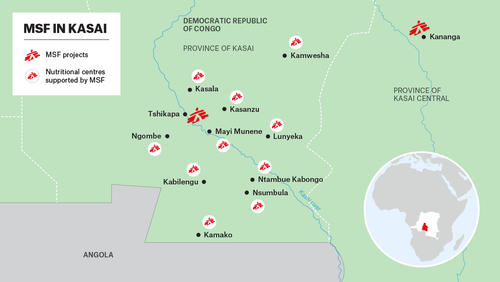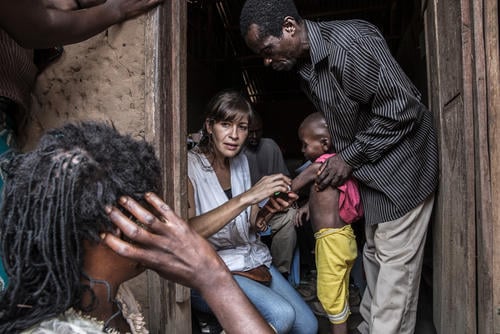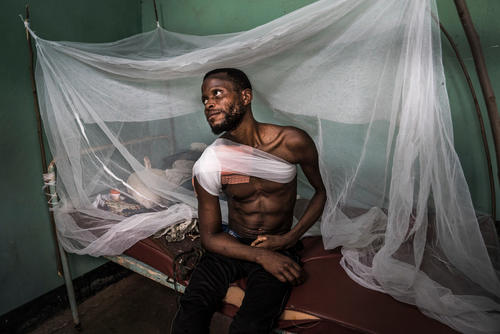Humanitarian crisis in Kasai
For more than a year, a wave of violence has transformed the Greater Kasai region of the Democratic Republic of Congo (DRC) into one of the most serious humanitarian crises in the world today. What began in August 2016 with the killing of a local chief by the Congolese armed forces, led to generalised unrest flaring through an area the size of Italy. The peak of violence in one of the country’s poorest provinces has died down but the humanitarian needs among displaced people and local communities are extremely high. MSF is focusing on assisting vulnerable people with the most urgent needs.

Overview of the humanitarian crisis
- More than 5,000 have died in 12 months of violence, according to the Conseil régional des organisations non gouvernementales de développement (Regional Council of Non-Governmental Development Organisations)
- More than 80 mass graves have been discovered
- More than 1.5 million people were displaced in the Greater Kasai region, doubling the total number of internally displaced people in Democratic Republic of Congo (DRC) to 3.8 million, according to the United Nations Office for the Coordination of Humanitarian Affairs (OCHA). According to another OCHA report, 710,000 people had returned to their homes in Kasai, while 762,000 remain displaced.
- 31,000 Congolese fleeing Kasai sought refuge in Angola according to UNHCR
In a region where life was already a struggle, it has become even harder for people affected by the conflict. People are slowly coming back to their homes, or what remains of them; many lost their belongings in attacks, many others still don’t have access to their land, which is accentuating the food crisis. Others are afraid of fully resuming their daily livelihood activities, as they fear losing everything again in fresh attacks.
Many houses have been burnt during fighting and attacks in the last months, and displaced people are hosted by local communities since there are no formal camps or sites. These people are living in a state of deprivation, lacking of food, healthcare, psychological support, and protection services.
The displacement, destruction and looting of homes, health centres and schools have worsened adversity in the province. Due to the violence in the past months, most of the local health centres visited by MSF teams have been deserted or lack medicines and staff. Insecurity, tensions and violence in this impoverished area has worsened and drastically limited basic medical services, which in some areas are totally inaccessible for the population.
Since the beginning of the crisis, more than 200 health centres and 400 schools have been looted, damaged or destroyed, and some one million people are now severely food insecure. Around 400,000 children are at risk of malnutrition, according to UNICEF.
The lack of structures, schools and health centres endangers access to basic health, social and educational services.
MSF operations
Kananga, Central Kasai
MSF has supported Kananga provincial hospital since April 2017. Here, the team created a temporary operating theatre and is managing the 72-bed trauma wing, offering free care for victims of violent and accidental trauma. MSF has completely rehabilitated the trauma wing where, between May and September, teams provided 1,242 emergency consultations, admitted 361 inpatients and performed 468 surgeries. The teams in Kananga and in the rural areas surrounding the cities also provided 14,100 consultations through mobile clinics.
The progressive reduction of conflict-affected patients in Kananga led the MSF team to reconvert the core activities towards areas in the province where needs are more urgent, and to refocus activities towards assisting victims of sexual violence. An MSF team in Kananga launched this service in June 2017 and has so far assisted more than 150 people.
As the flow of patients is significantly rising, our team in Kananga will continue to provide free medical care and psychological support to sexual violence survivors.
An MSF team is running exploratory missions in the countryside (Kasumba territory, south of Kananga) to assess medical needs, in order to expand activities in that area.
Tshikapa, Kasai
MSF is supporting a hospital and three health centres in the city of Tshikapa, the capital of Kasai province. Between June and September, over 200 surgeries and 5,000 paediatric consultations were performed; 155 people were treated for violence-related injuries; and 30 others for sexual violence.
In the rural areas of Kasai province, MSF medical teams arrive in villages, sometimes for the first time, to treat patients —mainly malnourished children— and to supply the local health centres with medicines and equipment.
Since MSF started working in the periphery of Tshikapa, the teams have supported the opening of ten ambulatory therapeutic feeding centres for children. Nearly 1,000 children have been treated for severe acute malnutrition in MSF-supported facilities in the urban and rural area of Kasai province since the beginning of the intervention.





